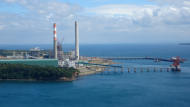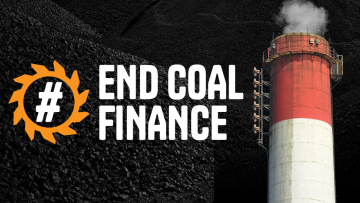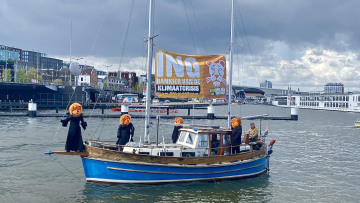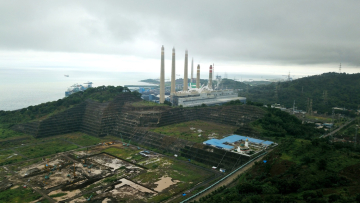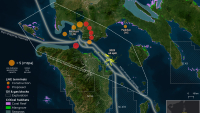
Company – On record
This profile is no longer actively maintained, with the information now possibly out of dateclimate@banktrack.org
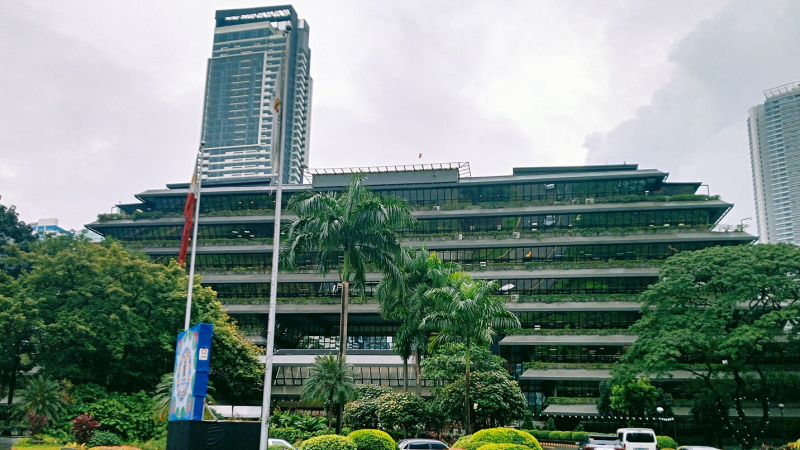
Company – On record
This profile is no longer actively maintained, with the information now possibly out of dateclimate@banktrack.org
Why this profile?
San Miguel Corporation (SMC) plans to expand its fossil fuel portfolio, most notably in the Verde Island Passage in the Philippines, one of the most biodiverse areas of the world. This is in spite of mounting concerns about the impact of these activities on local communities’ livelihoods, the climate and nature, as well as the company’s own claim of being committed to sustainability.
What must happen
Banks and other financial institutions must demand that their fossil fuel clients immediately halt all activities that expand fossil fuel extraction and infrastructure, and develop and implement credible phase-out plans for their existing fossil-fuel-based activities, on a timescale aligned with Paris Agreement goals. In the absence of such commitments, banks must stop financing San Miguel Corporation.
| Sectors | Electric Power Distribution, Retail Trade , Coal Electric Power Generation, Coal Mining, Commodities Trading, Construction, Gas Electric Power Generation, Mining, Oil and Gas Extraction, Oil-fired power plant, Train and Railroad Manufacturing, Transportation |
| Headquarters |
|
| Ownership |
listed on Philippine Stock Exchange
Top Frontier Investment Holdings Ltd. is the parent company of San Miguel Corporation, via its 66% stock ownership. |
| Subsidiaries |
|
| Website | http://www.sanmiguel.com.ph/ |
San Miguel Corporation, or SMC, is a multinational conglomerate headquartered in Mandaluyong, Philippines. It was initially founded in 1890 as a brewery. SMC now owns businesses and investments in various sectors via a range of subsidiaries. Sectors it operates in include food and beverage, packaging, energy (via subsidiary SMC Global Power), fuel and oil (via subsidiary Petron Corporation, the Philippines’ largest oil refining company), infrastructure, cement, property, and banking services.
San Miguel is a major developer and owner of fossil fuels. The company has almost 5 gigawatts of installed power generation capacity and provides about 20% of the power carried by the Philippines' national grid. It is a major player in the country’s liquid natural gas and coal industries.
San Miguel Corporation has a workforce of 50,433 and a revenue of P1.5 trillion (US $27 billion) as of December 2022. It is majority-owned (66%) by Top Frontier Investments Holdings Ltd.
Impact on human rights and communities
Health and livelihood damage from the Oriental Mindoro and Guimaras oil spills
San Miguel Corporation has repeatedly chartered vessels for its business that have then sunk in highly delicate marine ecosystems off the Philippines’ coasts, with dramatic impacts on peoples’ livelihoods. SMC has often subsequently denied any responsibility for the environmental and human damage, and refused to compensate victims.
A tanker chartered by a San Miguel Corp subsidy, the MT Princess Empress, sank off Mindoro, Philippines, on February 28 2023, in the Verde Island Passage. The ship spilled 800,000 litres of industrial oil into the ocean. SMC’s CEO, Ramon Ang, has avoided acknowledging SMC’s role in the Princess Empress spill. However, in April 2023, French experts discovered that the oil spilled by the Princess Empress vessel matched samples taken from the San Miguel Corporation subsidiary. The resultant oil slick affected 21,000 families in the province, threatening local communities’ food supplies, affecting local businesses and tourism, and causing health problems such as breathing difficulties, vomiting, diarrhoea, coughs, dizziness, eye irritation, and fevers.
An earlier incident has many parallels. In 2006, an oil tanker hired by SMC subsidiary Petron Corporation, M/T Solar 1, sank off the coast of Guimaras, spilling more than 1.3 of the 2.1 million litres of fuel oil it was carrying. The Guimaras Strait is about 200 miles south of the Verde Island Passage. The spill had devastating effects on the people and the environment, affecting 1,500 hectares of marine reserve area, including mangrove, seagrass, and coral reef areas. A national public health office also noted risks to humans, citing effects of exposure to the fuel oil including respiratory and skin ailments, cancer, leukemia, and congenital foetal abnormalities. Impacts of the spill could last for over 40 years.
As with the case of the Oriental Mindoro oil spill, Petron steadfastly denied any wrongdoing or responsibility for the vast oil spill on the basis that it was the owner of the cargo and not the ship. Separately, an ongoing lawsuit representing more than 1,000 locals was filed in 2012 and seeks USD $5.5m in damages from Petron.
Health impacts from coal plants in Bataan
The people of Bataan in the Philippines, many of whom depend on the sea for their livelihoods, have testified about severe coal ash contamination, and skin diseases due to pollution coming from San Miguel Corporation’s coal-powered plant. The adverse health impacts of coal ash waste from coal-fired power plants are well-established. The ash contains heavy metals, particulate matter and other toxic substances that are carcinogenic, and which cause respiratory illness, neurological damage, skin disease and developmental problems. San Miguel Corporation and its subsidiary Petron Corporation stayed silent in the face of complaints.
Repression of activists and land defenders
The high-profile murder of Gloria Capitan in 2016 occurred after her opposition to the coal industry on Bataan, a harrowing case in the wider trend of intimidation and repression experienced by land defenders and coal opponents in the Philippines. According to Global Witness, Ms. Capitan was murdered for her leadership of the Coal-Free Bataan Movement and her community organising work in opposition to Bataan coal projects. Specifically, she fiercely opposed the Seafront Shipyard and Port Terminal Services Corporation (“Seafront”) project on the basis of its pollution and breaking of environmental regulations. One of Seafront’s clients was San Miguel, which used the coal storage facilities located just next to Gloria’s village that she was protesting against. Leading up to her assassination by two gunmen, Gloria was offered bribes and suffered intimidation by political operatives connected to Seafront. Gloria Capitan was just one of a number of people who have been killed, harassed or wrongfully imprisoned while opposing companies like San Miguel that are involved in the Philippines’ fossil fuel value chain. SMC has been accused of inadequate compensation and consultation in other parts of its business: around 700 families stand to be evicted to make way for the New Manila Airport and local communities’ food security was under threat due to the project. Officers from SMC were accompanied by armed soldiers when visiting residents to be relocated, creating an atmosphere of intimidation, and residents said the compensation was insufficient for them to be able to continue their lives in spite of the disruption.
Impact on climate
Coal power, airport and LNG expansion in the Philippines
According to its 2022 sustainability report, San Miguel Corporation generates 18.2Mt CO2e in scope 1 and 2 emissions annually (pg. 125 of annual report), roughly 8% of annual emissions of the Philippines. San Miguel Corporation does not report scope 3 emissions, so could be omitting a significant portion of its climate impact from public disclosures.
San Miguel Corporation has built coal power projects and coal mines across the Philippines, through its energy arm SMC Global Power. SMC continues to own and operate the 1,025MW Masinloc, 536MW Limay and 300MW Davao power stations. According to the 2022 Global Coal Exit List, 1.9GW of SMC’s 5GW installed capacity (~40%) comes from coal.
San Miguel Corporation committed not to develop 1500MW of proposed coal projects in 2021, citing the Philippines government’s moratorium on coal from the year before. However, it did not drop “those already committed to, and required by the government”. This leaves considerable scope for San Miguel to generate revenue from coal well into the future, before these coal plants are retired. Indeed, the GCEL tells us that San Miguel Corporation has plans for 1900MW more coal power generation capacity (including new and expanded plants), almost double its existing capacity in 2021.
The New Manila International Airport is likely to have a huge climate impact: the airport’s construction will ultimately generate 1.5 million tonnes of carbon dioxide with annual plane emissions totalling 1 million tonnes of carbon dioxide at minimum, together amounting to more than 6 gas-fired power plants’ annual emissions. These figures relate solely to an airport capacity of 35 million passengers a year, which is only a third of the airport’s projected maximum capacity of 100 million passengers, meaning emissions could triple from these basic estimates.
Finally, San Miguel Corporation’s expansion plans include 14GW of proposed new gas-fired power capacity, making SMC responsible for half of all planned gas infrastructure in the Philippines and the ‘biggest developer of fossil gas in the Philippines and Southeast Asia’. The Batangas LNG terminal is the Philippines’ only existing LNG facility (where methane gas is converted from liquid to gaseous state to facilitate its transportation) and poses dire threats to the people and biodiversity of the Verde Island Passage. Batangas, which lies in the Verde Island Passage, is described as “the Amazon of the Oceans” by local communities due to the strait’s rich, pristine and delicate ecology (see “Nature” section below). Yet, in spite of its environmental significance, San Miguel Corporation is driving the destructive LNG boom in the area, being instrumental in the rapidly developing gas infrastructure around Batangas. San Miguel Corporation is responsible for the offloading of LNG from the terminal, where the fuel will be used to power SMC’s 1200MW Ilijan power plant, reopened for this purpose. SMC is also developing the 1.3GW Batangas gas-fired power plant, which will also draw LNG from the Batangas terminal, and which SMC will develop through financing from international banks including Standard Chartered, Mizuho and Deutsche Bank. SMC’s plans for accelerating the LNG infrastructure build-out in the Philippines will generate significant contributions of greenhouse gas emissions. Climate Analytics published a report in November 2023 saying that the Philippines can get its power sector onto a 1.5ºC-aligned pathway by replacing fossil fuels with renewables.
Impact on nature and environment
Ecological devastation from oil spills
A Philippines’ Supreme Court filing notes that "[t]he full extent of the Philippines' marine biodiversity is not known, but the best information available reveals an astounding variety of marine life: 5,000 species of clams, snails and mollusks; 488 species of corals; 981 species of bottom-living algae, and thousands of other organisms. Five of the seven sea turtle species known to exist in the world today occur in Philippine waters.'' All of this is directly threatened by SMC’s negligent activity.
The oil spills described above have had lasting, severe impacts on local biodiversity and ecology in the Philippines’ coastal waters. The resultant oil slick from MT Princess Empress carrying San Miguel Corporation’s cargo threatens biodiversity in more than 20 marine protected areas, including seagrass beds, mangroves, and pathways for fish larvae. The MT Solar 1 oil spill in Guimaras (as well as the related sinking of the Ras, its clean-up ship) has been called “an ecological time bomb”, leaking 100-200 litres of oil per hour. The fuel oil spilled in this incident, also called ‘black oil’, is particularly environmentally damaging and toxic to marine life. Local marine conservations estimated that 90% of the especially fragile Taclong Marine Reserve was impacted, where over 144 species of fish live. Studies on the surrounding mangrove forests noted albinism, stunted growth, and mangrove die-off as impacts of the oil spill. At least eight years after the catastrophic spill, marine waters were still exhibiting visible damage and local communities had still not been compensated or regained their previous way of life.
Environmental campaigners are especially concerned about these spills reaching the Verde Island Passage, a strait that separates the Philippine islands of Luzon and Mindoro, that is both a teeming hub of biodiversity as well as the contested epicentre of the Philippines’ fossil fuel expansion. The Verde Island Passage is known as the ‘Amazon of the Oceans’ for its rich biodiversity, and is home to 12,000 fisherfolk. A Philippines Supreme Court ruling said “the value of [the Verde Island Passage] cannot be overemphasized”: it has “the richest concentration of marine life on the entire planet”, with “extensive coral reefs, sea-grass beds, and dense mangrove forests”.
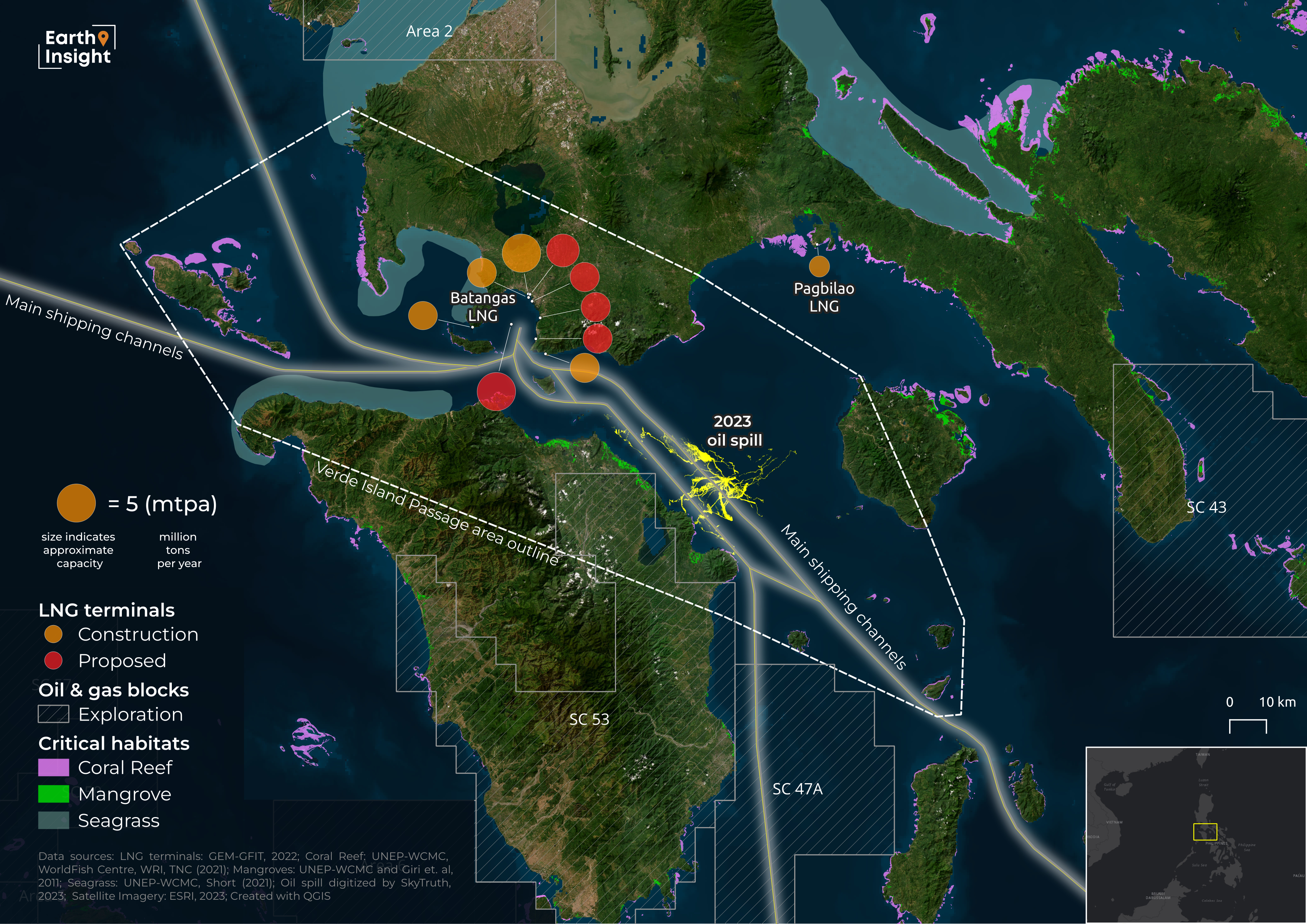
Ecological risks of the New Manila International Airport
According to a Global Witness report, San Miguel Corporation’s New Manila International Airport project threatens Manila Bay’s diverse coastal ecosystems, marine biodiversity, and migratory bird populations. Another study named ‘Manila Bay Sustainable Development Master Plan’ concluded that the airport ‘will further complicate the already stressed habitat and ecosystem of the area which is continuously hounded by unsustainable economic growth, land subsidence, and sea level rise’ and ‘will permanently damage the natural habitats at the site’. The bay has been designated a conservation area by the Philippine government, as the wetlands at Northern Manila Bay are of immense importance for migratory and resident waterbird populations. In 2013, a large oil spill from an underwater pipe contaminated waters in Manila Bay and prompted authorities to ban fishing. The oil pipe was owned by Petron Corporation, a subsidiary of San Miguel Corporation.
Marine life threats of the Masinloc coal plant
Coral and marine life in Oyon Bay have been heavily degraded after the expansion by San Miguel of its large Masinloc coal plant. The Oyon Bag Protector (OBP) NGO argued that the 700MW plant expansion has discharged toxic chemicals into the marine area and toxic fly ash (a byproduct of coal-fired power) has rained down on the local community, who have opposed the plant since its inception.
To secure a source for the coal that fuels its energy business, San Miguel Corporation aggressively acquired coal mining companies in the 2010s, including Bonanza Energy Resources Inc., Daguma Agro Minerals Inc., and Sultan Energy Phils Corp., which collectively own 70 million tonnes of coal over an area of 17,000 hectares. The exploitation of these coal reserves, and particularly the open-pit method of mining planned, have prompted strong criticism from local communities, faith groups and the government. This would jeopardise the regional water quality, food security, livelihoods and homes of Indigenous people in the large areas in which projects like the South Cotabato mine are being developed. The company has continued in spite of the opposition and aims to produce 180 million tonnes of coal from the concession.
Impact on pandemics
Last year, San Miguel Corporation disclosed plans to build 12 poultry “mega-plants”, massive farming, slaughter and packaging facilities, across the Philippines. The plans project the facilities will be operational in 2024, and cumulatively producing 960 million birds per year. There is consensus among academics and epidemiologists that intensive poultry farming is one of the major contributors to the risk of fast-spreading, lethal avian influenza viruses.
SMC’s Limay and Masinloc power plants are co-financed by the World Bank and a range of domestic and international commercial banks, including Rizal Commercial Bank.
According to the most recent Banking on Climate Chaos report, San Miguel Corp received financing from Standard Chartered, MUFG, Mizuho, SMBC, and Bank of China in 2022.
2022
2022-11-22 00:00:00 | Civil society wins SMC forfeit on LNG
Reliance Energy Development Inc. (REDI), a San Miguel Corporation subsidiary, pulled out of the proposed San Carlos City liquefied natural gas (LNG) project on the Philippines' Negros Island, amid lobbying and protests led by civil society and local stakeholders.
2022-10-31 00:00:00 | South Cotabato mine begins operation
Heavy machinery begins operating and extracting coal at the South Cotabato coal project, despite community opposition.
2022-08-31 00:00:00 | Local gvmt lifts ban on open-pit coal mining, benefiting SMC
The provincial government in South Cotabato, an area on the southern tip of Mindanao island, lifted a ban on open-pit coal mining, clearing the way for a SMC subsidiary, San Miguel Energy Corporation, to fell trees, clear land, and begin strip mining the area. Local residents and faith groups strongly criticised the local politicians and SMC on the basis of the destructive method of mining.
2022-02-28 00:00:00 | Princess Empress tanker, carrying SMC oil, capsizes
The Princess Empress tanker, carrying 800,000 litres of oil, capsizes off the coast of the Oriental Mindoro area in the Philippines.
2021
2021-01-31 00:00:00 | Supreme Court rejects civil society plea for environmental halt to SMC airport
The Supreme Court of the Philippines dismissed a plea by a civil society coalition including Oceana Philippines, a marine conservation group, asking for environmental protection of the site around the proposed New Manila International Airport.
2017
2017-01-31 00:00:00 | Gvmt orders cease-and-desist to SMC on Bataan coal plant
The Department of Environment and Natural Resources (DENR), under Environment Secretary Gina Lopez, announced that it was issuing a cease-and-desist order against San Miguel Corp., ordering the company to stop the operations of its Bataan power plant.

